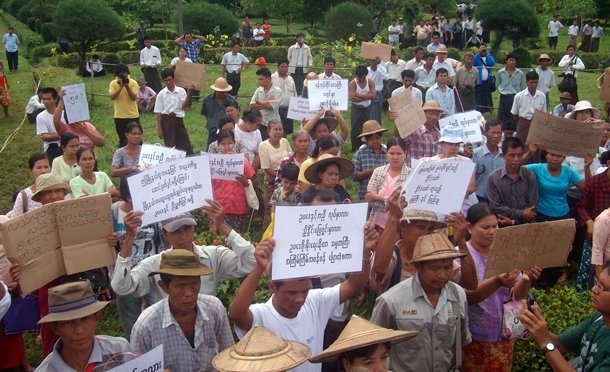New National Land Use Policy Must Reflect the Concerns of those Affected
By Burma Partnership • November 4, 2014 The Burma Government released its draft land use policy document and opened it up for consultations with the public. Despite this positive sign, the time for consultations is inadequate with no proper mechanism or space created for the meaningful participation of affected communities in order for their concerns to be reflected in the draft. The draft document itself has been heavily criticized for serving to further empower investors over small scale farmers.
The Burma Government released its draft land use policy document and opened it up for consultations with the public. Despite this positive sign, the time for consultations is inadequate with no proper mechanism or space created for the meaningful participation of affected communities in order for their concerns to be reflected in the draft. The draft document itself has been heavily criticized for serving to further empower investors over small scale farmers.
Since the beginning of the reform process in 2011, land grabbing, a practice that the previous military regime engaged in regularly, has hit new heights as a flurry of investors seek opportunities in previously untapped markets and the Burma Government liberalizes the economy. A prime example of this is the Dawei Special Economic Zone (SEZ) Project, a joint Thailand–Burma Government initiative that is seeking private investment to create one of the largest industrial zones in Asia. A report released by Dawei Development Association on 21 October 2014 highlights how 20-36 villages will be negatively affected. Concerns iterated by the local communities show that they have “lost farmlands and natural resources that are vital to their livelihoods, without prior information.” Furthermore “there was no meaningful consultation, and a deeply flawed compensation process.”
Land grabbing is often done with protection from the military, or by the military itself, for factories, infrastructure projects, mono-crop plantations, or military bases, and as with the Dawei SEZ case, usually without adequate or indeed, any compensation. It is a nationwide problem, both in ethnic areas, as documented by the Human Rights Foundation of Monland and Karen Human Rights Group, while in central Burma and delta areas, land grabbing is common place. Given that around 70% of the population of Burma is engaged in agriculture, and it is agricultural lands that are most often confiscated, it is one of the most pressing issues for Burma today.
Not only is land grabbing occurring on a systematic basis, but the current legal framework is woefully inadequate in protecting local communities. Article 37 of the 2008 Constitution states that “the Union is the ultimate owner of all lands and all natural resources above and below the ground, above and beneath the water and in the atmosphere in the Union.” Thus, the 2008 Constitution gives the government carte blanche to take any land it so wishes. Two laws enacted in 2012 benefit large-scale industrial farming/agribusiness at the expense of smallholder farmers. The Vacant, Fallow, and Virgin Land Law allows lands that have been deemed vacant, fallow or virgin to be allocated by a government body to the government, investors or individuals. A major flaw in the law is the lack of recognition of traditional or customary use of land, such as rotational agriculture, as productive use. The Farmland Law introduces Land Use Certificates (LUCs), which provide more land security than in the past, but still falls extremely short of providing any sort of reasonable land tenure. The process to obtain these LUCs is unclear.
Thus the need for a comprehensive land use policy is clear. Yet the process and content of the draft policy has many flaws. The consultation period is just three weeks, which for a 90 page document filled with technical language, is insufficient. In an analysis of the draft policy, the think-tank, Transnational Institute, highlights how it is investors, not farmers, that stand to benefit if this policy is rolled out, stating that it will “create a legal environment that is greatly beneficial for a small group of large national and international companies, but which has the potential to be hugely disadvantageous for millions of small-scale farmers.”
Thus we call on the Burma Government to allow sufficient time for meaningful and participatory consultations with relevant stakeholders, primarily the farmers who will be most affected by the land use policy as well as land rights activists, environmental groups and civil society organizations. Not only must these consultations be inclusive, meaningful, and participatory, but the perspectives and input from these communities must be incorporated into the new draft. This is one of the most vital policy areas for Burma and its reform agenda, and it is an opportunity for the Burma Government to create an enabling environment for the people to have ownership over the development agenda for themselves and their communities that is sustainable for decades to come. This opportunity must not be wasted.
Tags: 2008 Constitution, Burma Army, Burma Government, Burma Partnership, Dawei Development Association, Dawei Special Economic Zone, Environment, Farmers, Human Rights Foundation of Monland, Karen Human Rights Group, Land Confiscation, Land Law, Livelihood, National Land Use Policy, Thailand, Transnational InstituteThis post is in: Blog
Related PostsMyanmar: Release Four “Rohingya Calendar” Political Prisoners
Burma: Rights Priorities for New Government
Myanmar: Scrap or Amend new Law that could Grant Immunity to Former Presidents
Burma Army Moves to Tighten Grip on Power
Sounds of War Taint the Cheers of Election Success









 All posts
All posts